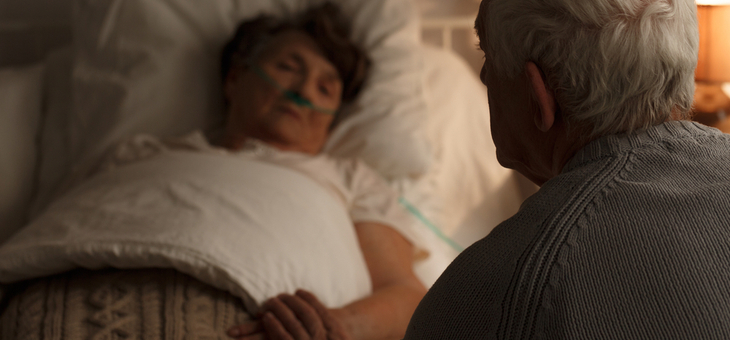How do you want to die? More than 70 per cent of Australians want the end to come at home, but only 10 per cent of people aged over 70 achieve that wish, according to the Productivity Commission.
Not-for-profit aged services provider ECH (Enabling Confidence at Home) is leading a campaign for Australians to talk openly about death with their family members and loved ones to ensure their wishes are followed and to avoid unnecessary difficulties after their passing.
“Australia has one of the lowest rates in the developed world for people aged over 70 exercising their right to die at home, with the majority dying in hospital or residential care,” says ECH. “This alarming trend is adding to the strain on hospitals and the healthcare system in general, and is contrary to what many people want.”
ECH chief executive Dr David Panter says part of having a good life is being able to have a good death.
“A third of us think about death or dying at least once a week, yet most people still find it difficult to talk about. Death has become clinical and medicalised and all too often older people don’t feel able to plan for a good death,” says Dr Panter.
“People will have different views on where they may like to die and for some it may be at home with family and friends around them. Whatever your wish, it’s important to have an open conversation with your family and friends so they are clear about your choices and can help these be fulfilled when the time comes. This conversation can also ease any stress and concerns that may have otherwise been bottled up and not spoken about.”
Read more: Why we must plan for death
Patti Waldmeir, who failed to have to have that crucial conversation with her beloved brother Peter, wrote “failing to prepare for death doesn’t make it go away”.
Peter had completed legal paperwork stating he did not want to be kept alive by a machine if he had almost no chance of recovery. Ms Waldmeir didn’t know that.
“My brother made the choices he made out of love: he wished to spare loved ones the anguish of facing his demise until they absolutely had to,” she wrote in the Financial Times.
“Those decisions tore our family apart at the time when we most needed to cling together. His funeral even had to be delayed because we could not agree on where to bury his ashes (he had left no wishes).”
Ms Waldmeir subsequently discussed her preferences about dying and palliative care with her children. But because feelings about death and dying might change later in life, she says we should revise end-of-life documents every few years.
Doing this work is “not just for the patient but for those who are left behind”, says Kate DeBartolo, director of The Conversation Project, an American organisation that promotes discussion of death and dying.
“We know that six months after the loss of a loved one, depression rates are lower if people have had this conversation.”
Read more: Protecting privacy and security after death
In the US, the COVID-19 pandemic led to more people dying at home.
“Across the country, terminally ill patients – both with COVID-19 and other diseases – are making similar decisions and dying at home rather than face the terrifying scenario of saying farewell to loved ones behind glass or during video calls,” NBC news reports.
“What we are seeing with COVID is certainly patients want to stay at home,” said Judi Lund Person, the vice-president for regulatory compliance at the National Hospice and Palliative Care Organization. “They don’t want to go to the hospital. They don’t want to go to a nursing home.”
American hospice organisations are reporting double-digit percentage increases in the number of patients being cared for at home. NBC reports that prior to the pandemic, many families hesitated to choose dying at home “because of the many logistical challenges, including work schedules and complicated medical needs”.
But when people were working from home during the pandemic, they had more time, and the inability to visit at nursing homes meant they learnt to cope with providing care at home.
The Conversation Project statistics, from before the pandemic, show that most people intend to have “the conversation” but never get around to it.
“More than 90 per cent of Americans say it is important to discuss their end-of-life wishes, but fewer than a third have actually done so.”
Read more: Dying and superannuation
The pandemic has not had the same tragic toll in Australia as in the US, but the need for us to discuss death and dying remains urgent.
“The earlier you start these conversations the better, so your friends and family understand your wishes,” says Dr Panter.
“Communicating your wishes not only prepares you for your own future, but can also enable those around you to speak freely so that when the time comes, everyone can feel more prepared.”
Essential end-of-life documents (healthdirect.gov.au)
Ideally, the person who is dying will already have the following documents in place:
- a will, stating how they want their belongings distributed after their death
- an enduring power of attorney, stating who can make legal and financial decisions for them if they are no longer capable of doing so
- an enduring power of guardianship, naming the person they want to make decisions about their medical care and lifestyle if they can’t do so themselves
- an advance care directive, also known as a living will, stating which medical treatment they do and do not want if they can’t make their own decisions.
Have you prepared these essential documents for family members? Have you had ‘the conversation’ about your death wishes with loved ones and family?
If you enjoy our content, don’t keep it to yourself. Share our free eNews with your friends and encourage them to sign up.

